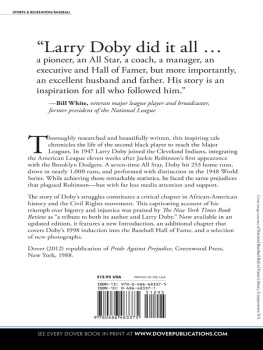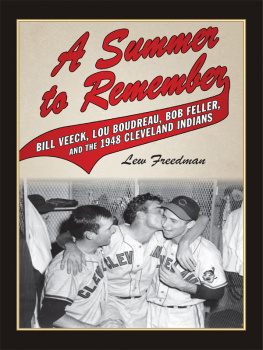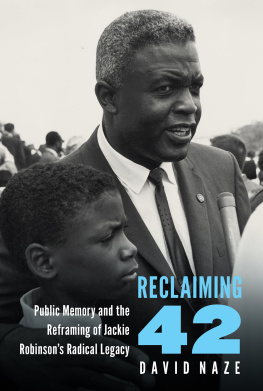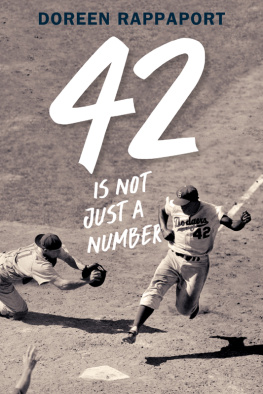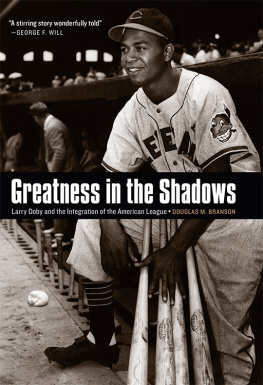Joseph Thomas Moore - Larry Doby
Here you can read online Joseph Thomas Moore - Larry Doby full text of the book (entire story) in english for free. Download pdf and epub, get meaning, cover and reviews about this ebook. year: 2013, publisher: Dover Publications, genre: Politics. Description of the work, (preface) as well as reviews are available. Best literature library LitArk.com created for fans of good reading and offers a wide selection of genres:
Romance novel
Science fiction
Adventure
Detective
Science
History
Home and family
Prose
Art
Politics
Computer
Non-fiction
Religion
Business
Children
Humor
Choose a favorite category and find really read worthwhile books. Enjoy immersion in the world of imagination, feel the emotions of the characters or learn something new for yourself, make an fascinating discovery.
- Book:Larry Doby
- Author:
- Publisher:Dover Publications
- Genre:
- Year:2013
- Rating:4 / 5
- Favourites:Add to favourites
- Your mark:
- 80
- 1
- 2
- 3
- 4
- 5
Larry Doby: summary, description and annotation
We offer to read an annotation, description, summary or preface (depends on what the author of the book "Larry Doby" wrote himself). If you haven't found the necessary information about the book — write in the comments, we will try to find it.
Thoroughly researched and beautifully written, this biography chronicles the struggles of the second black player to reach the Major Leagues. Larry Doby joined the Indians 11 weeks after Jackie Robinsons first appearance with the Dodgers. A Hall of Famer and seven-time All Star, Doby faced the same prejudices that plagued Robinson, but with far less media attention and support.
Larry Doby — read online for free the complete book (whole text) full work
Below is the text of the book, divided by pages. System saving the place of the last page read, allows you to conveniently read the book "Larry Doby" online for free, without having to search again every time where you left off. Put a bookmark, and you can go to the page where you finished reading at any time.
Font size:
Interval:
Bookmark:
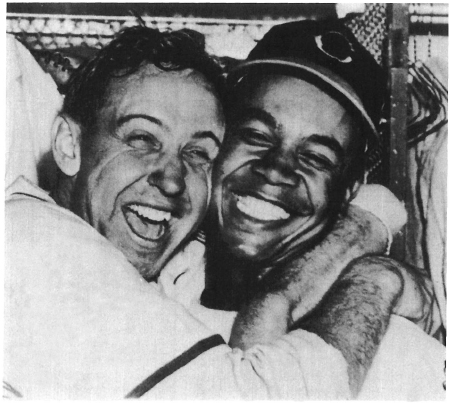
Celebrating in triumph, Steve Gromek and Larry Doby embrace and laugh after the fourth game of the 1948 World Series in Cleveland. Doby hit the home run which decided the outcome, 2-1, making Gromek the winning pitcher. The picture, one of the first to show affection between black and white athletes in the era of integration, became one of Dobys most cherished mementos. (Photo courtesy of Wide World)
LARRY
DOBY

JOSEPH THOMAS MOORE
WITH AN INTRODUCTION BY PAUL DICKSON
DOVER PUBLICATIONS, INC.
MINEOLA, NEW YORK
Copyright
Copyright 1988, 2011 by Joseph Thomas
Moore Introduction Copyright 2011 by Paul
Dickson All rights reserved.
Bibliographical Note
This Dover edition, first published in 2011, is an unabridged republication of Pride Against Prejudice: The Biography of Larry Doby , originally published in 1988 by Greenwood Press, Inc., New York. The author has provided a new Chapter (15) for this edition and additional photographs have been included. Paul Dickson has also provided a new Introduction.
Library of Congress Cataloging-in-Publication Data
Moore, Joseph Thomas.
Larry Doby: the story of the American Leagues first black player / Joseph Thomas Moore.
p. cm.
Originally published: Pride against prejudice. New York: Greenwood Press, 1988.
Includes bibliographical references and index.
ISBN-13: 978-0-486-48337-5
ISBN-10: 0-486-48337-1
1. Doby, Larry. 2. Baseball playersUnited StatesBiography. 3. Discrimination in sportsUnited States. 4. African American baseball playersCase studies. I. Moore, Joseph Thomas. Pride against prejudice. II. Title.
GV865.D58M66 2011
796.357092dc23
2011024133
Manufactured in the United States by Courier Corporation
48337101
www.doverpublications.com
For the late Ben Marmo,
and for Joan, whose encouragement
brackets my lifelong interest in Larry Doby
CONTENTS
Introduction to
the Dover Edition
In 1947 Larry Doby followed Jackie Robinson by 11 weeks in breaking baseballs long-standing, but unwritten, color bar. Robinson broke the racial barrier with Branch Rickeys Brooklyn Dodgers of the National League and Doby with Bill Veecks Cleveland Indians of the American League.
But it took Doby 36 years to join Robinson in baseballs Hall of Fame.
For years there were those who campaigned for Dobys Hall of Fame induction, but it intensified after 1997 when great attention was paid to the 50th anniversary of Robinsons baseball debut. With the 50th anniversary of baseball desegregation fading from memory, is what Ian OConnor wrote in the New York Daily News just before the 1998 balloting, its high time Larry Doby finished first. A survivor of cancer, a survivor of the same racism that confronted Jackie Robinson, Doby deserves to be voted into the Hall of Fame by its Veterans Committee. OConnor, who had been in contact with Doby, wrote that he defined his runner-up standing in a whole different context: Doby was a second-class citizen in the eyes of his very own country.
But when Doby was finally elected to the Baseball Hall of Fame later in the year, it was clear that he belonged there if only based on his performance on the field. In 1948, his second year in baseball, he batted .301 to help the Cleveland Indians to the World Series and once there, won Game Four with a home run. He was part of the last Indians team to win the Fall Classic. Doby was a fine hitter and outfielder, leading the American League in slugging, OBP, runs, homers (twice), and RBI. He set the Major League record of 164 errorless games in 1954 and 55a record that stood for 17 years. Doby played for 13 years with an overall .283 batting average, 253 home runs and 969 RBI. During his 13-year career he was named to seven All-Star teams.
The second reason is that Doby was a true pioneer. Doby was the first African-American to play in the American League, first to lead his league in homers, first to hit a World Series homer, and the first to win a World Series title. He was also MLBs second black manageragain following a man named Robinson, this time it was Frank Robinson.
Also Doby, who had a lackluster rookie year, had played in the Negro leagues but never spent a day in the minors and was not as well prepared for this role as Robinson. Baseball historian and author Daniel Okrent commented in 1995 Robinson had a two year drum roll, Doby just showed up.
If Doby lived in Robinsons shadowformer Baseball Commissioner Fay Vincent has compared Larry Doby to Buzz Aldrin, the second man on the moonhe also co-existed with Satchel Paige, the second African-American signed by the Indians. Doby was almost the opposite of Paige in terms of personality. Doby was a shy and subdued man, Paige was not. Paige attracted great attention, while Doby avoided it.
But Doby suffered as muchif not morethan Robinson, as detailed in the pages of this book. More evidence comes forth all the time. Lou Brissie, who began pitching for the Philadelphia Athletics in 1947, later told his biographer Ira Berkow how he listened in the dugout as his teammates shouted things like Porter, carry my bags, or Shoeshine boy, shine my shoes and well, the N-word, too. It was terrible. Brissie, who had been severely wounded in Italy and left for dead, was now pitching with a large metal brace on his leg and identified with Doby. He was a kind of underdog, like me Brissie told Berkow.
Bill Veeck, the man who had signed Doby, would later acknowledge that he had put Doby in a difficult situation. Not only being first in the American League, but even more difficult was the fact that he himself had never really been exposed to the virulence that racism took once he had donned an Indians uniform. Doby had played on integrated teams at an integrated high school in New Jersey and had played basketball at Long Island University. What he had not expected were those on his own team who would not shake his hand or the future Halls of Famers who would never speak to him.
Doby possessed a grace and tolerance that kept him from calling out those who had judged him by the color of skin. At Dobys funeral, his friend Joe Morgan told the standing-room-only church gathering: He never, ever told me who those guys were that wouldnt shake his hand because some were in the Hall of Fame. But he did tell me about Joe Gordon. Gordon was to Doby what Pee Wee Reese was to Robinson. In the half dozen conversations I had with Doby over the final five years of his life, Ian OConnor wrote, he mentioned Gordons gestures of kindness each and every time. But when Id ask Doby to name the opponent who once spat in his face, hed never budge.
Doby had the added pressure of the American League where he created an odd apprehension among other players who saw him as a threat. For his column in the New York World-Telegram , Dan Daniel interviewed an unnamed New York Yankee who feared the coming discrimination against white players. The reasoning was that the only reason the Veeck had brought Doby to the majors was simply because he was a Negro, and the Cleveland club wants to cash in on the Negro trade. He continued: I am not opposed to having Negroes in the majors. But let them go through the same rugged preparation as the white players. Send the Negroes into the minors and let them work their way up. He then added a warning, If there is discrimination against the white youngsters there will be trouble.
For reasons unclearbut proven out by historyintegration came harder to the American League
Next pageFont size:
Interval:
Bookmark:
Similar books «Larry Doby»
Look at similar books to Larry Doby. We have selected literature similar in name and meaning in the hope of providing readers with more options to find new, interesting, not yet read works.
Discussion, reviews of the book Larry Doby and just readers' own opinions. Leave your comments, write what you think about the work, its meaning or the main characters. Specify what exactly you liked and what you didn't like, and why you think so.

